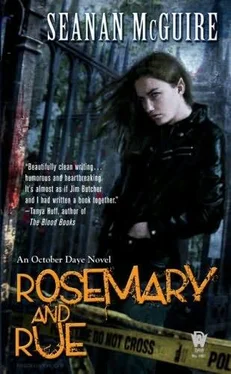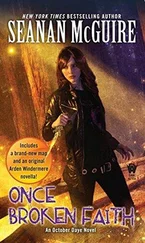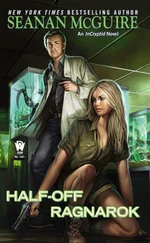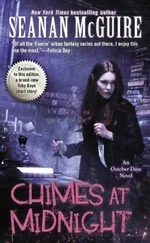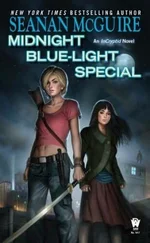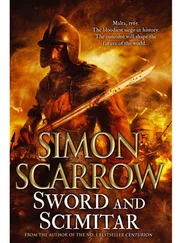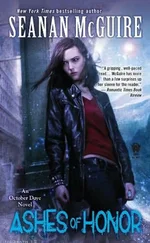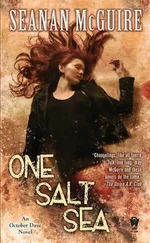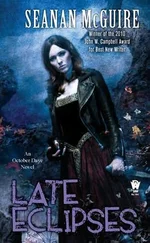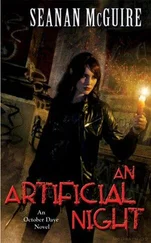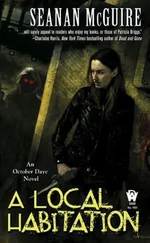“Female troubles,” I said, turning around to face him. He took an automatic step backward. “I know my shift doesn’t end for fifteen minutes, but tomorrow’s my day off, and I didn’t take a break tonight. Can I—”
“Go home. I’ll clock you out.” His gruffness barely concealed his dismay. He was clearly afraid that if I stuck around, I’d start giving him details.
It’s best not to question good fortune. I kicked off my uniform shoes and shoved them into my locker before grabbing out my coat and sneakers, pulling them roughly on, and taking off for the door without giving Pete a chance to change his mind. Three long steps past my disinterested coworkers and I was free, charging out into the freezing cold of the alley behind the store. The door slammed shut behind me, and everything was reduced to a pale, watery gray lit by the distant glow of streetlights.
The fog had rolled in since my shift started, making it impossible to see more than a few feet in any direction. I shoved my hands into my pockets, shivering. When it decides to get cold in San Francisco, it doesn’t mess around. As a little added bonus, I could feel the moisture already beading on my hair and skin. My shoes and the cuffs of my pants would be soaked through long before I made it home.
“Whee,” I muttered, and turned to start for the mouth of the alley. Once I was on the street, I could begin the long, mostly uphill walk home. If I’d stayed to the end of my shift, I would’ve taken the bus, but the encounter with Mitch had left me shaken, and the walk would do me good.
The chill dropped away as I began climbing the first hill between me and my destination, exertion providing the warmth I so desperately needed. I glanced at my watch. If the almanac at the supermarket was correct, we were about thirty-three minutes to dawn. It was enough time, if I didn’t slow down, stop, trip, or do anything but walk. The dawn destroys small enchantments, and that includes everything I’m strong enough to cast—like the illusion that allows me to pass for human. Worse, it’s incapacitating, at least temporarily. If I was in the open when the sun came up, I could find myself with a starring role in a tabloid before noon. Still, there was time, as long as nothing got in the way.
The street curved as it moved up the hill, taking me through the slowly paling morning. I kept my hands in my pockets and kept walking, trying to focus on getting home, trying not to think about Mitch going home to his family, or about much of anything else. All thinking did was make me remember what I’d already lost.
Everything was quiet, save for the distant rumble of traffic on the freeway. Shivering, I walked a little faster, heading down a side street into a neighborhood that smelled like rotten fruit and sweet decay. A black horse stood by the curb in the deepest part of the shadow, the smell of debris masking its characteristic blood-and-seaweed scent. Its eyes were red, and the look it gave me was inviting, promising wild adventures and fantastic delights if I’d just get onto its back. I waved it off with one hand, walking on. Only an idiot would trust a Kelpie this close to the water. Getting on its back with the scent of the sea in the air would be a fast, painful means of committing suicide, and I’m not a fan of pain.
The Kelpie took a few steps forward, eyes glowing. Hard as I’d been trying to deny the existence of Faerie, ignoring the threat wouldn’t make it go away. I sighed and stopped, folding my arms. “Are you sure you want to do this?”
It continued to advance.
Right. A more direct approach was needed. Unfolding my arms, I shoved my hair back and dropped the illusion hiding the shape of my ears. Careful to keep the exhaustion out of my voice, I asked, “ Really sure?”
Kelpies are smarter than horses, and they recognize a threat when they see one. I’m just a changeling, sure, but I was apparently willing to face down a Kelpie, alone, on a foggy night, within spitting distance of the water. It couldn’t count on my willingness being based on bravado. It took a step backward, baring an impressive array of fangs.
“Just keep going,” I said. That seemed to be the last straw. The Kelpie snorted, as if to say that there was bound to be easier prey somewhere else in the city, and took another step back, outline fading into the fog until it might as well not have existed. Camouflage is the hunter’s first and best defense. I stood there for several minutes, waiting for it to reappear, before slipping my hands back into my pockets and starting to walk again, a little faster now. Maybe the Kelpie was gone, but there was nothing stopping it from coming back with friends. More than one would be more than I could bluff.
Seeing Kelpies on the streets of San Francisco is annoying and a little unnerving, but it’s nothing to worry about. They have illusions to hide them when they need to be hidden, and even I can handle a Kelpie—they bite if you get too close, but they’re not that dangerous if you just refuse to ride them. There’s nothing wrong with having a few monsters in the shadows. They keep me remembering what it is that I’m walking away from.
My name does the same thing, and that’s why I’ve never changed it to something more normal. My mother was what she was, and I am what she made me, and she thought “October” was a perfectly normal name for a little girl, even one born in 1952 at the height of human conservatism. If that little girl’s last name happened to be “Daye,” well, that was all the better! She was a loon, even then, and I miss her.
The sky was getting lighter; my encounter with the Kelpie had slowed me down enough to take me into dangerous territory. I started to walk a little faster. Getting caught outside at dawn won’t kill me—sunrise is painful, not fatal—but dawn also means a massive increase in the human population, and the last thing I needed was someone deciding I needed medical aid while my illusions were off. I look closer to human than a lot of changelings do, but “close” doesn’t cut it on the streets of a human city.
The streetlights above me flickered and went out, giving a final warning of morning’s approach. Time was up. Hiking up the collar of my coat for a little more cover, I started to run. Not that it was going to do much good; I was still blocks from my apartment, and the light was moving a lot faster than I was. There was no way I was going to make it.
A narrow alley stretched between two buildings about half a block ahead. Forcing one last burst of speed, I raced to the alley’s mouth and ducked inside, moving as far back as I could before the growing pressure of the dawn forced me to stop and slump against the wall. I could feel it spread across the city, ripping down all the small illusions and minor enchantments of the night. Then the light hit the alley, turning my slump into a collapse, and I stopped thinking about anything more complicated than taking my next breath.
There’s nothing kind about the way sunrise affects the fae. Just to make it even less fair, it’s harder on changelings than it is on purebloods, because we have fewer defenses. The light didn’t quite burn, but it came close, filling the air around me with the ashy taint of dying magic. I kept my eyes closed, forcing myself to take slow, measured breaths as I counted down the moments between the dawn and the day.
When the pressure of the dawn passed enough to let me move again, I straightened, taking a shaky breath, and moved deeper into the alley. The aftereffects of sunrise last for five minutes—ten at the most—but most spells just won’t take during that time. That’s part of why it’s so dangerous to be outside at dawn. The threat of discovery is always there, and it’s not a good idea to take chances.
Читать дальше
